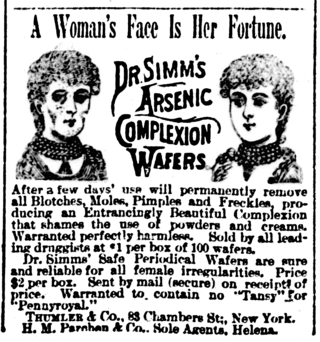Adware, often called advertising-supported software by its developers, is software that generates revenue for its developer by automatically generating online advertisements in the user interface of the software or on a screen presented to the user during the installation process. The software may generate two types of revenue: one is for the display of the advertisement and another on a "pay-per-click" basis, if the user clicks on the advertisement. Some advertisements also act as spyware, collecting and reporting data about the user, to be sold or used for targeted advertising or user profiling. The software may implement advertisements in a variety of ways, including a static box display, a banner display, a full screen, a video, a pop-up ad or in some other form. All forms of advertising carry health, ethical, privacy and security risks for users.

Advertising is the practice and techniques employed to bring attention to a product or service. Advertising aims to present a product or service in terms of utility, advantages and qualities of interest to consumers. It is typically used to promote a specific good or service, but there are a wide range of uses, the most common being the commercial advertisement.

A television advertisement is a span of television programming produced and paid for by an organization. It conveys a message promoting, and aiming to market, a product, service or idea. Advertisers and marketers may refer to television commercials as TVCs.

Absolut Vodka is a brand of vodka, produced near Åhus, in southern Sweden. Absolut is a part of the French group Pernod Ricard. Pernod Ricard bought Absolut for €5.63 billion in 2008 from the Swedish state. Absolut is one of the largest brands of spirits in the world and is sold in 126 countries.
An advertising agency, often referred to as a creative agency or an ad agency, is a business dedicated to creating, planning, and handling advertising and sometimes other forms of promotion and marketing for its clients. An ad agency is generally independent of the client; it may be an internal department or agency that provides an outside point of view to the effort of selling the client's products or services, or an outside firm. An agency can also handle overall marketing and branding strategies promotions for its clients, which may include sales as well.

Classified advertising is a form of advertising, particularly common in newspapers, online and other periodicals, which may be sold or distributed free of charge. Classified advertisements are much cheaper than larger display advertisements used by businesses, although display advertising is more widespread. They were also commonly called "want" ads, starting in 1763, and are sometimes called small ads in Britain.
The halo effect is the proclivity for positive impressions of a person, company, country, brand, or product in one area to positively influence one's opinion or feelings. The halo effect is "the name given to the phenomenon whereby evaluators tend to be influenced by their previous judgments of performance or personality." The halo effect is a cognitive bias which can prevent someone from forming an image of a person, a product or a brand based on the sum of all objective circumstances at hand.
Google AdSense is a program run by Google through which website publishers in the Google Network of content sites serve text, images, video, or interactive media advertisements that are targeted to the site content and audience. These advertisements are administered, sorted, and maintained by Google. They can generate revenue on either a per-click or per-impression basis. Google beta-tested a cost-per-action service, but discontinued it in October 2008 in favor of a DoubleClick offering. In Q1 2014, Google earned US$3.4 billion, or 22% of total revenue, through Google AdSense. In 2021, more than 38 million websites used AdSense. It is a participant in the AdChoices program, so AdSense ads typically include the triangle-shaped AdChoices icon. This program also operates on HTTP cookies.

False advertising is the act of publishing, transmitting, or otherwise publicly circulating an advertisement containing a false claim, or statement, made intentionally to promote the sale of property, goods, or services. A false advertisement can be classified as deceptive if the advertiser deliberately misleads the consumer, rather than making an unintentional mistake. A number of governments use regulations to limit false advertising.

In politics, campaign advertising is propaganda through the media to influence a political debate and, ultimately, voting. Political consultants and political campaign staff design these ads. Many countries restrict the use of broadcast media to broadcast political messages. In the European Union, many countries do not permit paid-for TV or radio advertising for fear that wealthy groups will gain control of airtime, making fair play impossible and distorting the political debate.
In advertising, an insert or blow-in card is a separate advertisement put in a magazine, newspaper, or other publication. They are usually the main source of income for non-subscription local newspapers and other publications. Sundays typically bring numerous large inserts in newspapers, because most weekly sales begin on that day, and it also has the highest circulation of any day of the week.

Massive Incorporated was an American advertising company that provided software and services to dynamically host advertisements within video games. Massive Incorporated was purchased by Microsoft in May 2006 for approximately $200 million to $400 million.

Space advertising is the practice of advertising in space. This is usually done with product placements during crewed space missions.

Digital marketing is the component of marketing that uses the Internet and online-based digital technologies such as desktop computers, mobile phones, and other digital media and platforms to promote products and services. It has significantly transformed the way brands and businesses utilize technology for marketing since the 1990s and 2000s. As digital platforms became increasingly incorporated into marketing plans and everyday life, and as people increasingly used digital devices instead of visiting physical shops, digital marketing campaigns have become prevalent, employing combinations of search engine optimization (SEO), search engine marketing (SEM), content marketing, influencer marketing, content automation, campaign marketing, data-driven marketing, e-commerce marketing, social media marketing, social media optimization, e-mail direct marketing, display advertising, e-books, and optical disks and games have become commonplace. Digital marketing extends to non-Internet channels that provide digital media, such as television, mobile phones, callbacks, and on-hold mobile ringtones. The extension to non-Internet channels differentiates digital marketing from online marketing.

The first-person shooter video game Halo 3 was the focus of an extensive marketing campaign which began with the game's developer, Bungie, announcing the game via a trailer at the Electronic Entertainment Expo in May 2006. Microsoft, the game's publisher, planned a five-pronged marketing strategy to maximize sales and to appeal to casual and hard-core gamers. Bungie produced trailers and video documentaries to promote the game, partnering with firms such as Digital Domain and Weta Workshop. Licensed products including action figures, toys, and Halo 3-branded soda were released in anticipation of the game; the franchise utilized more than forty licensees to promote the game, and the advertising campaign ultimately cost more than $40 million.

Halo 3: ODST is a 2009 first-person shooter game developed by Bungie and published by Microsoft Game Studios. The fifth installment in the Halo franchise as a side game, it was released on the Xbox 360 in September 2009. Players assume the roles of United Nations Space Command Marines, known as "Orbital Drop Shock Troopers" or ODSTs, during and after the events of Halo 2. In the game's campaign mode, players explore the ruined city of New Mombasa to discover what happened to their missing teammates in the midst of an alien invasion. In the "Firefight" multiplayer option, players battle increasingly difficult waves of enemies to score points and survive as long as possible; Halo 3's multiplayer is contained on a separate disc packaged with ODST.

The Advertising Standards Authority (ASA) is the self-regulatory organisation of the advertising industry in the United Kingdom. The ASA is a non-statutory organisation and so cannot interpret or enforce legislation. However, its code of advertising practice broadly reflects legislation in many instances. The ASA is not funded by the British government, but by a levy on the advertising industry.

The Life, also known as We Are ODST, is a television and cinema advertisement launched in 2009 by Microsoft to promote the first-person shooter Halo 3: ODST in the United States. The 150-second piece follows a young soldier through enlistment, training, and battle as an Orbital Drop Shock Trooper (ODST), analogous to a paratrooper that drops from space to a battlefield. The Life was created by advertising agency T.A.G., an offshoot of McCann Erickson. Production of the commercial itself was handled by production company Morton/Jankel/Zander (MJZ). It was directed by Rupert Sanders, and post-production was conducted by Asylum. It was filmed in Hungary, just outside Budapest in a coal mine and abandoned factories to give the sequence an "Eastern Bloc" aesthetic. The commercial and its associated campaign proved hugely successful; on the week of its launch, Halo 3: ODST became the top-selling game for the Xbox 360 worldwide, and over 2.5 million copies were sold within the first few weeks of release. The Life went on to win a number of honours from the advertising and entertainment industries, including two Clio Awards, a London International Advertising Award and several honours from the Cannes Lions International Advertising Festival, the most prestigious awards ceremony in the advertising industry.

MTV Pinoy was a Philippine music and entertainment pay television network owned by Viacom International Media Networks Asia, with a partnership with Viva Entertainment to collaborate on local productions, events, marketing and advertising sales. The network was launched on February 1, 2014. It operated from 4 pm to 1 am, after that it would rebroadcast MTV Asia's programming.
Tatiana Aleksandra Westbrook, best known under her vlogger name Tati, is an American YouTuber and makeup artist.














